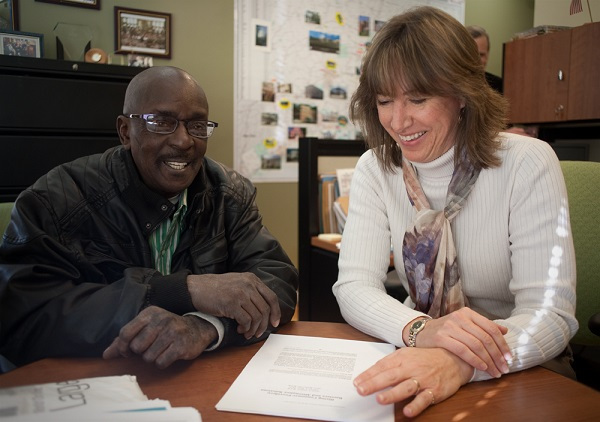Fighting for the Rights of Those who Served
The Connecticut Veteran's Legal Center helps military veterans resolve legal issues that stand in the way of them finding stability in their civilian lives.
 |
| A Connecticut Veteran's Legal Center attorney provides counsel to a veteran at the Errera Community Care Center in West Haven. |
Many military veterans experiencing homelessness and poverty have legal issues that stand in the way of them finding stability in their civilian lives. Securing benefits, upgrading a discharge status, resolving landlord disputes, or restoring a driver's license are all problems that are difficult to resolve without a background in law. But many veterans don't have access to the legal help they need.
A recent Department of Veterans Affairs study found that when homeless veterans are asked to prioritize their unmet needs, they rank legal services higher than food, clothing, medical care, and even housing. The Connecticut Veteran's Legal Center works to help fill this gap.
The nonprofit started seven years ago with its largest support from The Community Foundation for Greater New Haven. It has since grown from one full-time employee to nine, and last year it worked on 876 cases, according to Executive Director Margaret Middleton.
Working out of a small office in the Errera Community Care Center in West Haven, the legal center serves veterans from all over the state. Many of its cases are common to poverty law such as evictions, custody support payments, and consumer debt. However, it is the only clinic in the state with practice areas that specialize in helping veterans modify discharge statuses and in making VA disability coverage compensation claims.
To illustrate the scope of the problem, Middleton says that the VA health system excludes veterans at four times the rate as happened following World War II.
"Veterans have particular needs that are not met by legal aid," Middleton says. "We'll see somebody who had a psychotic break while they were in the military, but didn't seek any medical help at the time. We know the person has a condition, but there is nothing documenting the disorder. We have to do factual development with interviews and search through the records to document what happened."
Many veterans are experiencing mental health problems related to their service but are unable to access health benefits because they were discharged with a less-than-honorable status, according to Middleton. Active duty service members, she says, are not protected by the same workplace procedures as civilians and can receive a less-than-honorable discharge at the discretion of a commanding officer.
"People who may have been oppositional or getting into fights, related to PTSD or depression, aren't in the best place to advocate for themselves. A commanding officer may come to a serviceman and say, 'Look, if you sign this paper, you can go home this afternoon,'" Middleton says. "The serviceman then waives rights in exchange for getting the heck out, not anticipating he won't receive any benefits down the road."
To learn more about The Connecticut Veteran's Legal Center, visit its profile on giveGreater.org.
Did you know?
Connecticut's effort to end veteran's homelessness has achieved "functional zero," which means that housing is available for every homeless veteran that enters the homeless system.
This story is part of the Inspiration Monday story series produced by The Community Foundation for Greater New Haven.
